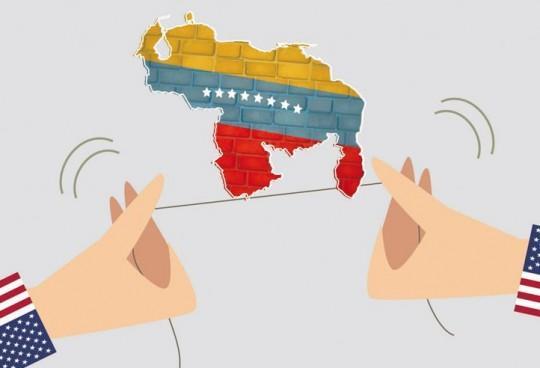
CARACAS, Venezuela.— The unilateral coercive measures (U.S. Coercive Measures) to which the U Government has subjected Venezuela, caused -according to an estimate- the contraction of 37 % of the GDP per capita in this country.
Undoubtedly, "the impact of sectoral and secondary sanctions is indiscriminate and deliberate. Economic pain is the means by which they are supposed to work. But it is not Venezuelan officials who suffer the costs. It is the Venezuelan people."
This is how Congressman Jim McGovern described it in the letter he sent, in May 2021, to President Joe Biden, in which he also demands the cessation of the sanctions regime.
His approach is supported by a report published by the Center for Economic and Policy Research (CEPR), in which U.S. experts specialized in these areas analyze the context in which the July 28 presidential elections took place.
According to the study, and as is already known, the U.S. "has intervened heavily in Venezuela during the last 25 years, starting with the military coup of 2002." It includes the oil strike of 2002-2003 and the progressive imposition of economic sanctions since 2004.
According to Mr. Fernando Camejo Pérez, a specialist at the Cuban Ministry of Foreign Affairs, "the system of unilateral coercive measures towards Venezuela is based on the Venezuelan Defense of Human Rights and Civil Society Act (Public Law 113-278), of December 18, 2014, and Executive Order 13692 (Obama Decree), of March 8, 2015."
To these are added seven executive orders and as many others issued by Congress which are complemented "with the regulations issued by the Office of Foreign Assets Control, the approval of federal funds to internal subversion and the execution of foreign policy actions aimed at coercing economic partners of the country."
However, the impact of the measures and of the interference activity in this nation goes beyond the economic and political spheres. Its weight does not only fall on the financial and business sectors, and some "unsuitable" officials. According to the CEPR document, "they have claimed tens of thousands of lives, in addition to causing devastating damage to public health".
Now, what is achieved with the economic asphyxiation of the people? Evidently, these are a conditioning mechanism inserted within the hybrid war against the South American nation.
Directly attacking the family economy and the welfare of the population leads to discontent, discomfort, dissatisfaction and even the perception -for some- that maintaining a socialist government would imply the persistence or intensification of sanctions.
We could say that the electoral campaign of María Corina Machado and Edmundo González Urrutia was the escalation of sanctions and threats that preceded the vote. But the dispute, in the elections and after them, has not been between that duo and Nicolás Maduro, but between the United States and what Chávez's legacy represents for Washington.
COINCIDENCES SURROUNDING ONE OF THE WORLD'S RICHEST COUNTRIES
In popular wisdom, one of the strongest certainties, without a doubt, is that there are no coincidences. So much so, that we could not say that Washington's perennial insistence on attacking the Bolivarian government is only a product of the arrogance of wanting to seize power.
According to information provided by WikiLeaks, among the documents disclosed by this platform over the years, the name of Venezuela is mentioned on more than 170,000 occasions.
Where? In files that illustrate how the U.S. and Europe have tried to overthrow - for a long time and unsuccessfully - legitimately instituted governments, mostly through foreign interference, with funding from some 300 NGOs.
Why? Well, since Hugo Chávez Frías was elected President, and later with Nicolás Maduro at the head, the State made common goods available to the people, perfectly evidenced by the Seven Transformations.
This program works on the empowerment in the areas of economy; full independence; peace, social and territorial security; social; politics; ecology; and the insertion and leadership of Venezuela in the new world configuration.
Last Thursday, the Executive Vice-President, Delcy Rodríguez, announced that private banks will add financing for entrepreneurs, as well as the creation of a banking system for the protection of credit risk.
In addition, according to the Central Bank of Venezuela, the GDP increased by 8.78 % in the second quarter of the year, which brings the country to 13 quarters of sustained economic growth, in spite of the more than 900 unilateral coercive measures imposed by the United States Government.
On the other hand, Bolivarian Venezuela is on the way to strengthening ties with emerging actors of the new multipolar configuration, as a guarantee of collective and national development. In this sense, the interest shown in joining the Brics stands out, thus dealing a blow to the hegemonic transnationals.
Back to the numbers: Venezuela has a geostrategic position, as it is a crucial point for the maritime and air routes connecting North and South America, Europe and the Caribbean.
It also has large deposits of cobalt, the so-called "blue gold", highly demanded in the technology industry. It is declared the largest gold reserve on the continent and has more than 40 types of minerals and precious stones, and numerous ecosystems and biodemas coexist there. It also controls the world's largest oil reserves and is among the world's largest reserves of natural gas, iron and diamonds.
And what is the world's largest consumer of oil? The United States, with approximately 19,000,000 barrels per day. So, is it coincidence or perspicacity of the imperialist friends in their eagerness to grab one of the richest territories?








